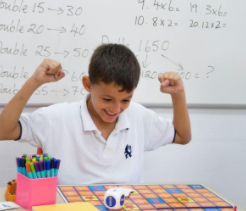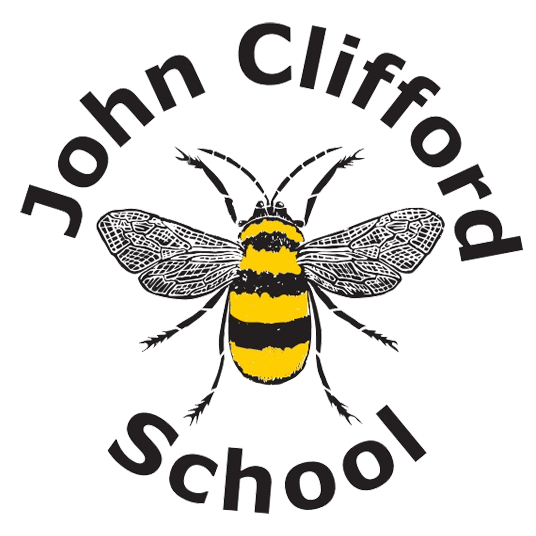Why do we teach Maths at John Clifford School?
Our aim at John Clifford is to make sure that children develop a deep understanding of primary mathematics as a foundation for secondary school and later life. It enables children to understand and appreciate relationships and pattern in both number and space in their everyday lives. We believe that all children can succeed at mathematics. Our staff combine a positive mindset with strong subject knowledge to encourage a love of learning and a resilience that enables everyone to achieve. Our children will build fluency with key number facts and the four operations alongside the ability to reason and solve problems both in the classroom and the wider environment.
The National Curriculum for Maths aims to ensure that all children:
- Develop a positive attitude to mathematics as an interesting and attractive subject in which all children gain some success and pleasure;
- become fluent in the fundamentals of mathematics so that they develop conceptual understanding and the ability to recall and apply knowledge rapidly and accurately;
- can solve problems by applying their mathematical skills to a variety of problems with increasing sophistication, including unfamiliar contexts and to model real-life scenarios;
- can reason mathematically by following a line of enquiry – developing and presenting a justification, argument or proof using mathematical language
At John Clifford, these skills are embedded within Maths lessons and developed consistently over time.
A copy of a presentation about maths at our school that was delivered to parents and carers in 2022/2023 by the Maths Leader can be found at the bottom of this page and also here: PowerPoint Presentation (johnclifford.school)
How do we teach Maths at John Clifford School?
Our curriculum is underpinned by a consistent use of representations, resources and language across school that provides the building blocks for children’s understanding of maths. We seek to encourage children’s natural curiosity by teaching maths in a way that fosters both enjoyment and confidence. During their time at John Clifford School, children will identify and understand key mathematical patterns, making sense of how maths is used to shape and develop our world. The importance of maths in the curriculum is underlined by its application in every other subject, whether that is understanding map scales or populations in geography, collecting and analysing data in science or using timings and distances in PE. In the classroom, children are given opportunities to work independently and in flexible groups, learning key facts, calculation skills and applying their knowledge.
Teaching takes place in whole classes; research has shown that children learn best in a non-streamed environment at primary school, although some groups – including children working at greater depth within the subject –receive additional support or tuition according to their individual needs.
While teaching the National Curriculum, staff draw upon a wide variety of resources that best fit the objective being learned. These include equipment (‘manipulatives’) such as cubes, counters and counting frames which are consistent across school, so that children can quickly reinforce the links in their learning as they move between year groups. These concrete manipulatives are used alongside pictorial representations such as part-whole models and bar models that build a deep understanding of mathematical concepts. Traditional abstract written calculation is taught and used alongside mental calculation skills, enabling children to choose the most efficient method for problem-solving. Further information is contained in our calculation policy: 1 JC Maths Calculation Policy updated 2024 web version.pdf (johnclifford.school)
To help embed the number fluency that is essential for success at maths in Key Stage Two and beyond, we use the Maths Circle sites Numbots and Times Tables Rock Stars (TTRS). All children from Reception to Year 6 have a subscription to these secure sites that allows them to practise number facts for addition, subtraction, multiplication and division in a fun and secure online environment - both at school and home. The Maths Leader and teaching staff monitor the use of Numbots and TTRS, setting appropriate challenges and recognising progress with number fluency. Weekly awards are given out at Star Assembly for effort, achievement and progress in Numbots and TTRS. You can see more about these here: Times Tables Rock Stars - John Clifford School
What are the outcomes for our children?
First and foremost, our goal is for children to gain a fluent understanding of basic mathematical principles alongside an ability to reason and an enjoyment of the subject. Historically, children can under-achieve in maths because they think that they can’t do it or are not naturally good at it; we actively tackle this misconception with a positive and supportive environment and the fostering of a growth mindset which is visible across the school. Since the impact of the Covid-19 pandemic, our Year 6 SATs Maths results have been slightly below National Average but are consistently rising. Our Year 4s have made excellent progress with the annual Multiplication Tables Check with an average score in line with the National Average. We are proud of the progress that our children are making and we are continuing to work as hard as we can to deliver the best possible outcomes in future years.
![]() The National Curriculum for Mathematics
The National Curriculum for Mathematics


